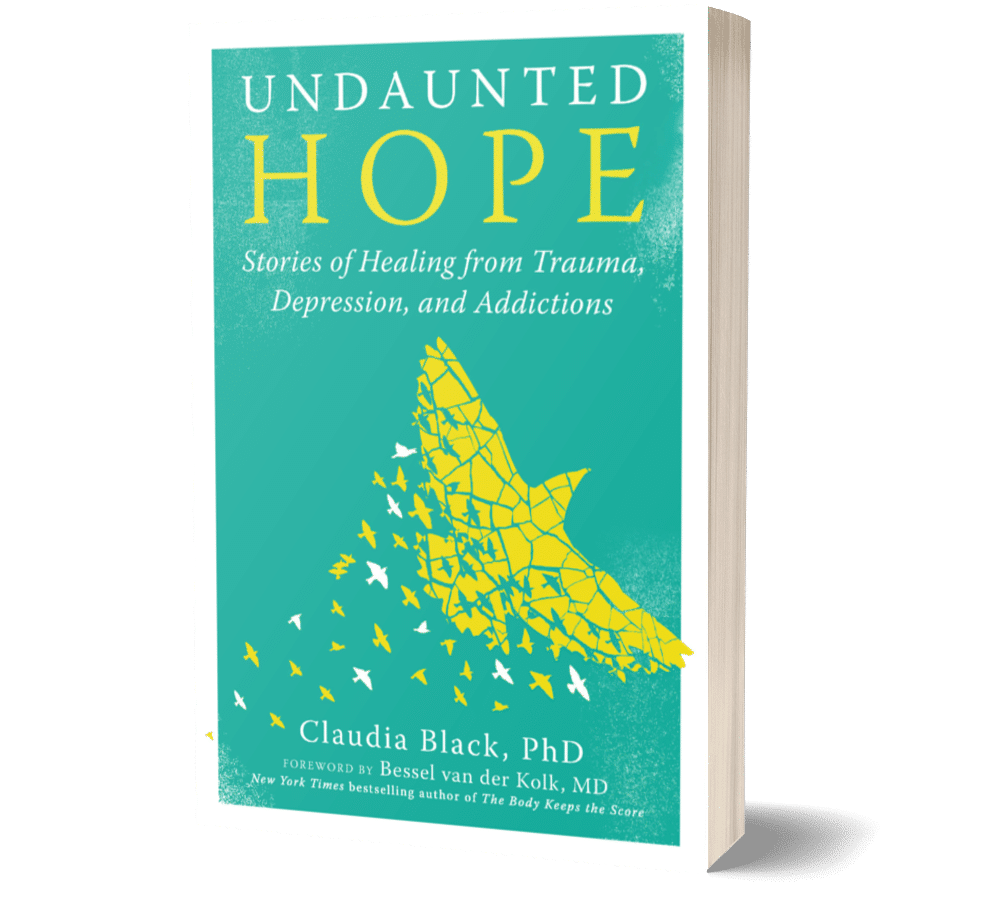By Anna McKenzie
Dr. Claudia Black’s new book Undaunted Hope is not just filled with stories of addiction and recovery; it’s brimming with tales of lives made new, of trauma understood and uprooted, and of the personal transformation that can come from asking for help and receiving it. Founder of the Claudia Black Young Adult Center, Dr. Black is also a Meadows Senior Fellow. Alongside other renowned treatment experts, including Dr. Patrick Carnes, Dr. Tian Dayton, Dr. Peter Levine, Resmaa Menakem, and Dr. Richard Schwartz, Dr. Black provides compassionate and insightful commentary on real-life recovery stories and reveals a path to healing for those who have similar struggles.
What’s Covered in the Book
The focus of Undaunted Hope is the experience of trauma and its manifold effects on human thriving. In the beginning, you’ll discover the nature of trauma and the importance of identifying and addressing it. In the middle, you’ll read dramatic personal accounts of people who experienced trauma, dealt with addiction, emotional pain, and various disorders. You’ll also take in powerful stories about those who broke free from these conditions and rediscovered their authentic selves through treatment and support. Finally, you’ll get to hear from some of the family members of those who went through treatment, because loved ones also suffer and need support throughout the recovery process.
Dr. Black and her colleagues reveal insights through their commentary on these stories and show you what was going on under the surface of each person’s struggle. They also discuss what was helpful to each person’s recovery and how healing is possible.

The nature of trauma is that it is not always easy to identify. Some events are significant and leave us with a terrible feeling that continues to throb within our minds and bodies like a deep ache; other incidents are more subtle, recurring, and tend to leave us feeling empty, unsettled, and quick to despair. Both kinds can keep us stuck and drive us to cope in unhealthy ways. In many respects, we’re all dealing with wounds of the past that need to be addressed and grief that needs to be processed.
In the book’s introduction, Dr. Black writes, “You may come from a childhood where the people you needed to rely on weren’t trustworthy, so today you have a difficult time reaching out and trusting others. It’s possible you didn’t have any role models giving you permission to ask for help when warranted. You may have grown up uncertain of how to get even your basic needs met. So, you stayed silent. What you are experiencing can be explained; there are words to describe it. There is a path out of your struggle, and it begins with willingness. Just by reading this book, you have begun.”
The Value of Putting Words to Your Experiences
Trauma ignites our biological fight-or-flight response, which helps us to escape danger; but if we feel that we can’t truly escape the danger, our survival energy gets caught within our bodies. “Trauma occurs as a result of the initiation of the instinctual cycle that is not allowed to finish,” writes trauma expert Dr. Levine. “Yet there are many effective strategies for becoming unstuck, for releasing ourselves from the terrible grip of trauma, for good.”
That’s why being able to put words to our trauma and its effects is so important. In an interview for the Beyond Theory podcast, Dr. Black says, “It’s important to not be in denial about the trauma that has taken place. But we need to go beyond just knowing our narrative knowing what happened; we need to connect that to, What’s happening in my life today? Otherwise, it becomes a blaming process, and [it’s] never meant to be a blaming process.
“Exploring so-called ‘my history,’ is really about undoing the denial system, because now it’s become a skill — denial. So I want to let go of the skill of rationalizing, minimizing, discounting, so I can see the truth … And it’s about a grief process. But we have to connect it to it.”
How Trauma Shows Up
The stories you’ll read in Undaunted Hope are from Meadows alumni, both men and women, who have struggled with a variety of different conditions, from substance abuse to sex addiction, intimacy disorders, and eating disorders. Some survived traumas such as being a child soldier, sexual abuse, and parental suicide; others dealt with perfectionistic environments, being a different race than their family members, or experiencing devastation as a young adult.
How trauma builds up in our lives can be both straightforward and complicated, and it can show up in many different ways. It doesn’t simply start with substance abuse, affairs, or disordered eating. It starts with problems at work, in relationships, and with ourselves.
The stories you’ll read in Undaunted Hope are from Meadows alumni, both men and women, who have struggled with a variety of different conditions, from substance abuse to sex addiction, intimacy disorders, and eating disorders.
“In the workplace, it can show up in a variety of ways,” says Dr. Black on Beyond Theory. “I don’t ask questions, and I make assumptions. And so therefore, I make a lot of erroneous assumptions because I’m not asking for enough information … If I’m highly controlling, then I’m going to be very dismissive of other people. If I really only learn to listen to myself because there weren’t a lot of people around for me to listen to, I don’t have good listening skills. It could also show that I overwork, I lack boundaries, I lack in my own self-care because I’m trying to prove something to somebody. Maybe I’m trying to prove my own worth to myself. So those are ways it shows up in the workplace, and intimacy.
“[Another] way it can show up is [when] I really don’t know I don’t have healthy boundaries. So I can end up being in a victim role, I can end up being offensive with people because of a lack of healthy boundaries. I can end up caretaking other people, putting their needs ahead of my own, which can set me up for my own depression that sets me up to attract people who don’t take responsibility for themselves. I mean, they can go [at] it really in every direction.”
These problems can evolve into personal and relational issues that cause intense conflict, job loss, financial strain, mental health conditions, and even physical pain, which may lead to further trauma and a wide range of compulsive and unhealthy coping behaviors.
The good news is that trauma can be resolved, and resilience can be built. We don’t have to continue to endure the pain or pass it on to others. Meadows Senior Fellow Menakem writes, “Like trauma, resilience can be passed down from generation to generation. One of the best things we can do for ourselves and our descendants is to metabolize our pain and heal our trauma.”
Start Your Recovery Now
Just like the stories in Dr. Black’s book, you too can begin your recovery story at The Meadows and resolve the trauma that’s disrupting your life. You can learn how to take positive steps toward a healthy self-image and thrive in your relationships. With our compassionate approach and research-backed model of treatment, you can heal and learn how to sustain your recovery in the long-term. Contact us today to learn more.

